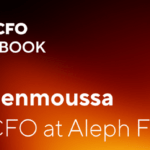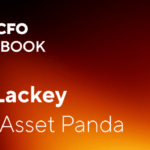Manish’s Playbook: Breaking glass and building business
Manish is an experienced public company executive leading finance teams, investor relations, and corporate development. He has extensive experience in building finance systems and processes for high growth SaaS companies, defining inorganic strategy, identifying and evaluating acquisition targets, structuring and negotiating transactions, and integrating the acquired companies. His prior experience includes working with major Wall Street investment banks, having started his career at JP Morgan / H&Q and earning an M.B.A. from Columbia and B.Tech in Computer Science from IIT, India.
In this episode of the CFO Playbook, Manish talks about why he got into finance so he could be in a position to make impactful decisions for businesses, and explains why the role of a CFO is very different now than it was just a couple of decades ago. Manish also describes what he feels are the general misconceptions of the CFO role, how technology is important to the finance function, what current CFOs must do in order to raise capital, and how he achieves cohesion within his team when hiring and retaining employees. In addition, he provides his view on the current fintech market and how to navigate the new normal when dealing with restricted funding availability.
Cultivating coherence within a team structure
Successful CFOs don’t operate without a team behind them. Hand selecting passionate individuals with relevant work experience is key to building that group that will act as the backbone for a CFO. Push your teams to learn and be adept at a variety of things, helping them grow to become better professionals down the road.
“One of the things that I look for, and probably the most important thing when I’m interviewing people, is what I call fire in the belly. So unless I see somebody’s really passionate, the fact that they have lots of years of experience, relevant experience, have worked at compelling businesses, all of that is good. But to me, a motivated individual who wants to succeed is way more important than trying to find that square peg for that, you know, square hole.”
Being comfortable breaking the glass
The role of CFO is multifaceted. As the position encompasses more and more, their scope of responsibilities also increases. A great CFO knows how to lead with inclusivity, without causing turmoil internally, but also knows what’s best for the future of the company.
“Part of the CFO’s function also is, unfortunately, you need to be comfortable to break some glass. And you can’t be successful, if you are just a ‘yes’ man, the CFO is not the role for you. You should be super comfortable saying no to many things. You should be super comfortable breaking glass. I think those are the traits that define a great CFO versus just an average one.”
Communicating efficiently
A great CFO understands the scope of their role in its entirety. People from all across the business look to them for guidance. Whether it’s employees, investors, or senior leadership, the CFO needs to be able to communicate efficiently with all stakeholders to help enable the business to be successful.
“We live in a world of soundbites. If you look at how companies go public, investors have 30 minutes to understand the story, look at some financials and figure out, do they want to make a big multimillion dollar investment? And that squarely lies on the CFO. So distilling complex technology aspects or business aspects, and the ability to explain it in an easy to understand fashion. Super important for a CFO.”
Finding success as a CFO
The CFO role in today’s world is a very empowered role. They are responsible for far more than just finance and accounting. As the role has evolved over time, it’s taken on many responsibilities of the CEO and therefore must understand and appreciate the inner workings of the entire company. A CFO is required to interact with other parts of the organization and should view themselves as enablers for the rest of the business.
“A CFO shouldn’t really view that he or she has a particularly well defined swim lane, they should view the entire business as something that they can actually have a say in, and the more comfortable they are with that, the more successful they will be.”






